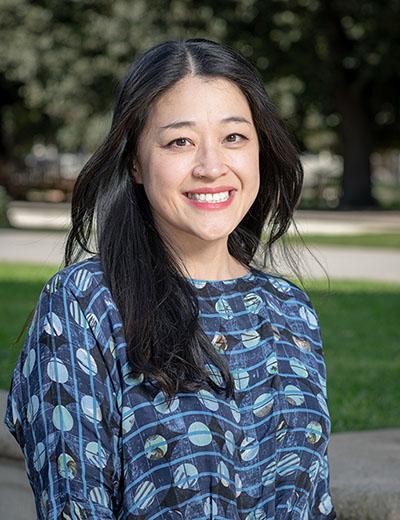
Assistant Professor of 媒体艺术 & 文化 林文丽 arrived at Occidental in 2020 as a visiting assistant professor of media for social change. 林有博士学位.D, in media art from City University of Hong Kong, an MFA from Sandberg Instituut in the Netherlands, a master of professional studies from New York University’s Tisch School of the 艺术, 和B.A. in psychology with an Asian American studies minor from UC Berkeley. Lin is a media artist and educator with a background in psychology, 纪录片, 视频艺术, and interactive installation. Her research interests focus on issues of representation, 性别, 迁移, 以及亚洲侨民.
What attracted you to Occidental?
The MAC faculty was the first big draw for me. I had the pleasure of meeting Allison de Fren at a Visible Evidence conference at the University of Southern California. I traveled from Japan in order to present my work on the topic of participatory video and domestic 劳动 in Hong Kong. Allison was in the audience of my panel and warmly invited me to join her afterwards for a coffee. It is through this meeting that I came to learn about the 媒体艺术 & 文化 Department at 十大正规网赌平台 and why I later applied for the Media in Social Change NTT position when it circulated the following year. I did not imagine I would leave Japan, but Allison left such a strong impression on me, I thought it would be a once in a lifetime chance to work with her!
I started the position remotely from Tokyo in 2020, teaching at crazy hours. 我会在晚上8点睡觉.m.我1点起床.m., and start teaching at 2 a.m.! Looking back, I honestly cannot believe I was coherent. 尽管如此, I still felt connected to the students and to the faculty in the MAC department as they made me feel very supported.
The liberal arts environment was another big draw for me. I appreciate the opportunity to develop courses based on my research and practice. I have had experience both as a student and teacher in large classrooms. The smaller class sizes provide space to get feedback from students on the curriculum and experiment with pedagogy. I often have non-MAC majors in my elective level courses and find so much satisfaction in getting these students out of their comfort zones.
After three years at the College, what are your impressions of Oxy students?
Oxy的学生是最好的! They are respectful, driven, ambitious, and have huge hearts. It has been such a pleasure teaching them and learning from them. It is clear that Oxy students have been raised very well by their parents and value generating strong relationships. I am always happy to get life updates from my graduated students.
When did you develop an interest in representation, 性别, 迁移, 以及亚洲侨民?
This is a great question because so much of this is tied into my own identity. I first understood the importance of representation as an undergraduate student of 纪录片maker Loni Ding who encouraged students to create media about communities at the margins. 我在纽约大学的时候, my friends and I created a self-portrait video workshop with young women from New York City’s Chinatowns and that is when I started to work with participatory video. When I moved abroad to the Netherlands, I was attracted to other migrant and diasporic communities and wanted to learn more about them. This is when I started Voices of Women Media, an organization that uses participatory media making methods so that narratives from these communities can be created from members of the communities themselves.
Do you have any new projects in the works?
I am currently working on a video project about the generational impact of a mother’s 迁移 for an exhibition called Another Beautiful Country at Pacific Asia Museum in January 2024. It is curated by Jenny Lin at USC’s Roski School of Art and Design and features artists working with “fluctuating ideas of nationhood as explored by artists who identify, however partially or conflictedly, 作为美籍华人.”
Anything else you would like to add?
I encourage students to sign up for the available MAC electives as they are open to all majors. Although a lot of my courses focus on the Asian diaspora, they attempt to mix theory and practice. 例如, this semester my MAC 260: Women Make Waves: Women’s Media and Migration class is col劳动ating with criminologist Julie Ham at Brock University. We are giving students a framework to think about women’s 迁移 and to apply this to a video project on issues of 性别, 劳动, 和迁移.
